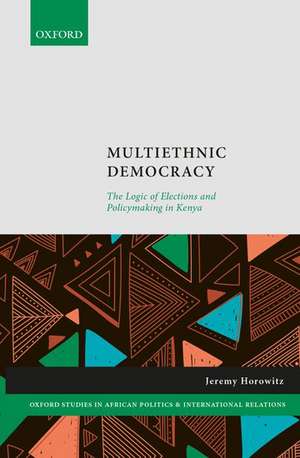Multiethnic Democracy: The Logic of Elections and Policymaking in Kenya: Oxford Studies in African Politics and International Relations
Autor Jeremy Horowitzen Limba Engleză Hardback – 3 mar 2022
Preț: 498.46 lei
Preț vechi: 612.36 lei
-19% Nou
Puncte Express: 748
Preț estimativ în valută:
95.39€ • 99.22$ • 78.75£
95.39€ • 99.22$ • 78.75£
Carte disponibilă
Livrare economică 13-19 martie
Preluare comenzi: 021 569.72.76
Specificații
ISBN-13: 9780198852735
ISBN-10: 0198852738
Pagini: 224
Dimensiuni: 164 x 240 x 18 mm
Greutate: 0.49 kg
Editura: OUP OXFORD
Colecția OUP Oxford
Seria Oxford Studies in African Politics and International Relations
Locul publicării:Oxford, United Kingdom
ISBN-10: 0198852738
Pagini: 224
Dimensiuni: 164 x 240 x 18 mm
Greutate: 0.49 kg
Editura: OUP OXFORD
Colecția OUP Oxford
Seria Oxford Studies in African Politics and International Relations
Locul publicării:Oxford, United Kingdom
Recenzii
Using carefully collected data on voters and on the dominant discourse in recent campaigns, Horowitz shows that Kenyan elections are fought over swing voters, who are typically not co-ethnics of any of the major candidates.
Multiethnic Democracy demonstrates the limitations of viewing politics in Africa solely through the lens of ethnicity. Horowitz shows that electoral campaigns revolve as much around universalistic appeals designed to capture ethnically-unaligned swing voters as they do around mobilizing candidates' ethnic bases. This results in public policies that are less shaped by communal concerns than is often assumed. For those interested in understanding the contours of contemporary African politics, this book is a must read.
In Multiethnic Democracy, Jeremy Horowitz provides new insights into electoral campaigns that will undoubtedly shape the emerging debate concerning Africa's ongoing democratization. The book's original empirical analyses – e.g., the location of campaign rallies, the content of campaign speeches, etc. – will turn this book into a model that other scholars will seek to emulate. And the book's clear prose makes its insights easily absorbed by a broad readership. I have no doubt that this work will be cited often by those who study Africa and multiethnic societies around the world.
In Multiethnic Democracy, Jeremy Horowitz challenges the conventional wisdom that political competition in Kenya revolves solely around ethnic-based patronage and the forging of elite coalitions. Analyzing an impressive range of data sources, he shows that candidates also routinely engage in broad-based appeals, often favoring universal policies that benefit a wider range of citizens. His optimistic and nuanced portrait of how democratic incentives can foster normatively desirable outcomes rests on a foundation of solid empirical evidence with important implications for the study of African political development.
Multiethnic Democracy demonstrates the limitations of viewing politics in Africa solely through the lens of ethnicity. Horowitz shows that electoral campaigns revolve as much around universalistic appeals designed to capture ethnically-unaligned swing voters as they do around mobilizing candidates' ethnic bases. This results in public policies that are less shaped by communal concerns than is often assumed. For those interested in understanding the contours of contemporary African politics, this book is a must read.
In Multiethnic Democracy, Jeremy Horowitz provides new insights into electoral campaigns that will undoubtedly shape the emerging debate concerning Africa's ongoing democratization. The book's original empirical analyses – e.g., the location of campaign rallies, the content of campaign speeches, etc. – will turn this book into a model that other scholars will seek to emulate. And the book's clear prose makes its insights easily absorbed by a broad readership. I have no doubt that this work will be cited often by those who study Africa and multiethnic societies around the world.
In Multiethnic Democracy, Jeremy Horowitz challenges the conventional wisdom that political competition in Kenya revolves solely around ethnic-based patronage and the forging of elite coalitions. Analyzing an impressive range of data sources, he shows that candidates also routinely engage in broad-based appeals, often favoring universal policies that benefit a wider range of citizens. His optimistic and nuanced portrait of how democratic incentives can foster normatively desirable outcomes rests on a foundation of solid empirical evidence with important implications for the study of African political development.
Notă biografică
Jeremy Horowitz is an Assistant Professor of Government at Dartmouth College. His research focuses on electoral politics and policymaking in Africa's emerging democracies. He has published in numerous scholarly journals such as Comparative Political Studies, Political Behaviour, Electoral Studies, and the British Journal of Political Science.













